Short Fiction Review: March–April 2025
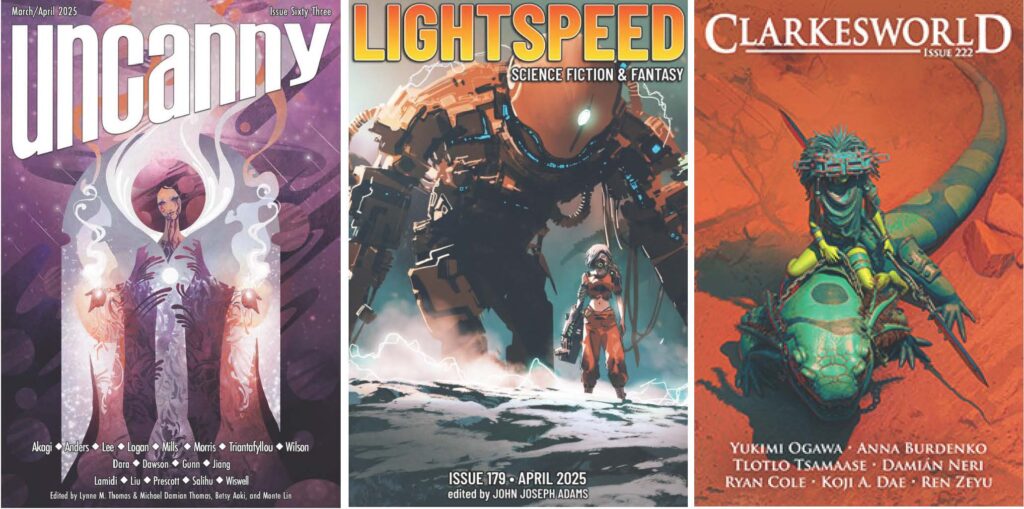
My favorite stories from March and April all lift up the importance of human connection in one way or another.
Short Fiction Review: October 2024
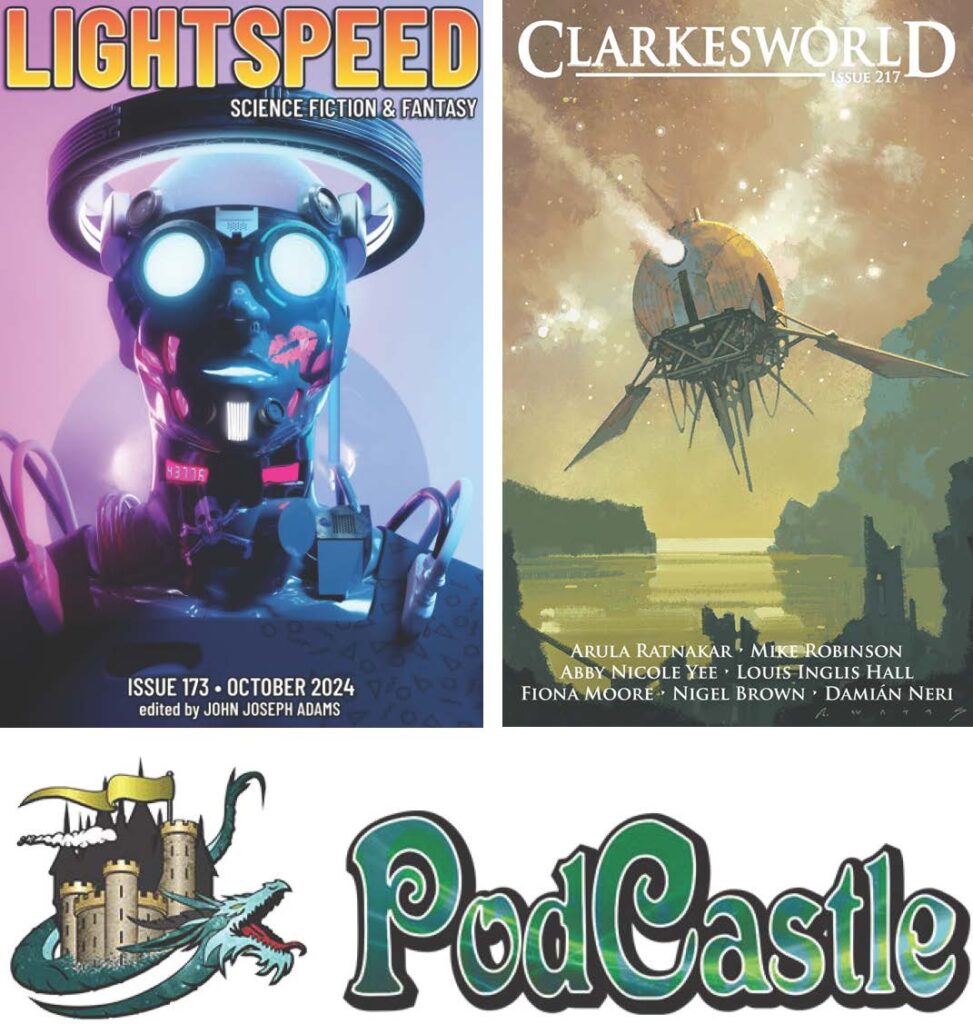
My favorite stories from October feature characters who care deeply for their local community, for communities across the world, and for their planet itself. In “Hot Hearts” by Lyndsie Manusos (published in Lightspeed Magazine Issue 173), a headstrong woman is determined to terraform a lifeless rock into a world that bears life. In “The Children of Flame” by Fiona Moore (published in Clarkesworld Magazine Issue 217), a woman tries to hold her community and its allies together when they are threatened by a contemptible acquaintance from her past. In “A Most Lovely Song” by Albert Chu (published in PodCastle Episode 861), a talking bird accompanies a Chinese boy and his descendants through times of war and protest, but the bird might not be as altruistic as it first seems. Let’s get to it. “Hot Hearts” by Lyndsie Manusos Dallas signed up and trained to foster a planet, and she chose a solo mission. Now, she has awakened from hyper sleep in a remote and lifeless solar system, and it’s her responsibility, all on her own, to guide and jump-start her planet into a habitat that can support life. She was prepared for this to be difficult, but now that she’s here, she sees it’s even more hopeless than she was prepared for. Here’s how the story begins: Dallas gazed out the viewing window of her ship, beheld her planet, and despaired. She’d anticipated something more. Better. She’d studied the worst-case scenarios. She’d read about the lost causes. But she’d never really believed one would be her first. Why had the program given her a shell? One thing I like about this story is how it diverges from more traditional narratives about terraforming planets and colonizing space. Dallas is trying not only to birth an atmosphere and make the planet capable of supporting life, but to cultivate a planet filled with life. However, there is no direct mention of preparing the planet to be colonized by humans. Earth is referred to as a failed planet and Dallas’s namesake as “a city that no longer existed”, so presumably people may want to immigrate to this planet, but colonizing the planet doesn’t seem to be the primary goal, since terraforming it will take decades or centuries and since Dallas is on only one of many such missions scattered throughout the galaxy. Instead, it seems the primary goal here is simply to foster life. It’s a beautiful vision of environmental (planetary?) stewardship. “Hot Hearts” is also just a motivating, inspiring read. Dallas wakes from hyper sleep to a monumental, near-impossible task. Sure, she feels overwhelmed and hopeless at first, but she’s intelligent, resourceful, and committed — and she has an encouraging audio diary from her mother. I found it powerful to see Dallas persevere and rise to the challenge before her. She is a headstrong character intent on bending a planet to her will, and I found it tremendously fun to watch her try. “The Children of Flame” by Fiona Moore Morag is doing the best she can in a fallen world. After society as we know it has collapsed, Morag tends to her farm, cooperates with the people around her, and tries to help them cooperate with each other. She’s pretty good at it, even when dealing with the Children of Flame, an odd group of religious nomads who spend the winter in Morag’s village. She faces a true challenge, however, when visited by a former acquaintance, a wannabe warlord running a protection racket. This story reminds me of two others. First, it reminds me of A Canticle for Leibowitz by Walter M. Miller Jr. Like A Canticle for Leibowitz, it takes place after civilization has fallen, during an interregnum where some people are cooperating and trying to preserve knowledge while others work to accumulate resources and power for themselves. There’s an interesting tension in this story in which some characters feel pressured to either embrace feudalism or become nomads while Morag tries to preserve peaceful cooperation as a realistic choice. Also, like A Canticle for Leibowitz, “The Children of Flame” pays attention to the role of religion, something I always appreciate. The Children of Flame are a strange religious group who seem to abstain from talking for most of the year, who practice rituals the villagers don’t understand, and who say wonderful things like, “We have to stop the sky wolves from eating the sun.” They aren’t explained in much detail (which is a shame because I’d love to read more about them), but that isn’t a problem because they feel believable and fascinating and the core conflict in the story has more to do with the wannabe warlord. This story also reminds me of “Masque of the Red Death” by Cory Doctorow, a story included in Doctorow’s Radicalized collection which I previously reviewed on this site. Both “Masque of the Red Death” and “The Children of Flame” explore conflicts in post-apocalyptic settings between cooperators working to foster community and selfish individualists who serve only themselves. “Masque of the Red Death” is focused on a prepper who brings about his own tragedy, while “The Children of Flame” tells a story about how the cooperators manage to unite and support each other in a moment of danger, which makes this story feel more upbeat and hopeful. It also has a fun robot. You can’t go wrong with weird, friendly robots. [Editor’s note: Fiona Moore has more stories involving Morag and Seamus the robot, as well as others, at Clarkesworld.] “A Most Lovely Song” by Albert Chu This story opens in Chongqing in 1939. After a young boy’s father is killed in a Japanese bombing campaign, the boy meets a magical talking bird that offers him advice and helps lead him to safety. The story then progresses through three other scenes: Korea in 1951, New York in 1970, and New York in 2024. In these scenes, the boy and his descendants find themselves facing wars and protest movements, and always the magic bird is there
Short Fiction Review: July – August 2024
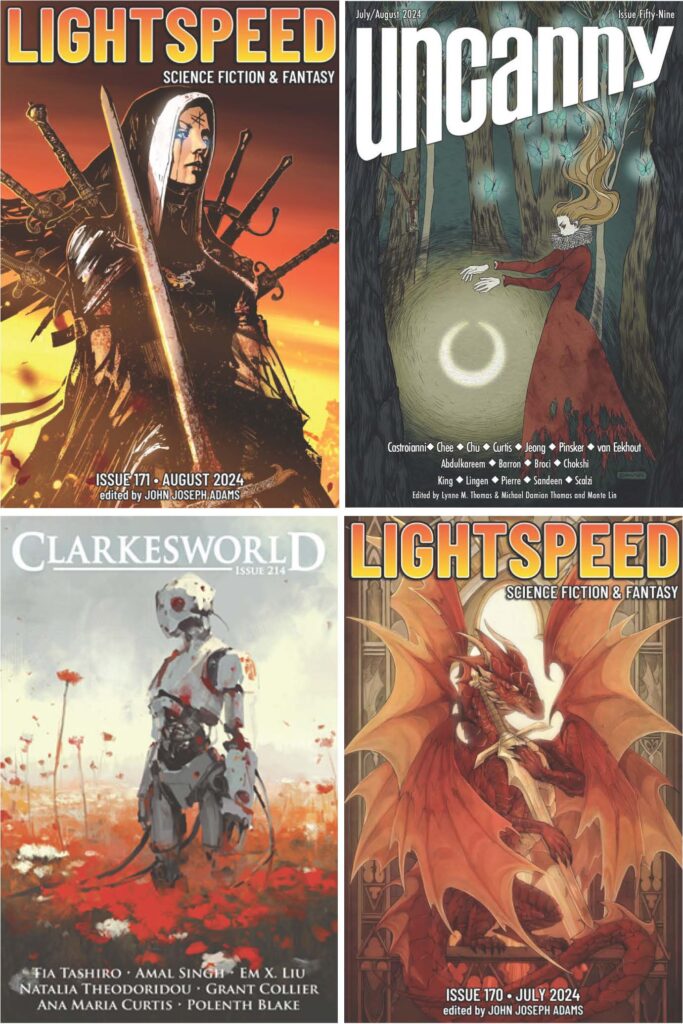
Let me tell you about my four favorite stories from July and August. … Have you read these stories? What did you like about them? What were your favorite stories from the last couple months?
Short Fiction Review: May 2019
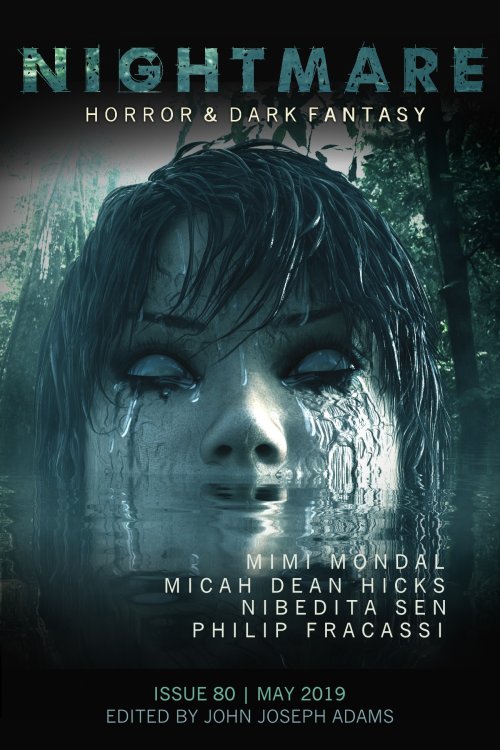
My favorite stories from May all happened to be about resistance. They all had good and satisfying endings, although none of them had a clean ending where everything was wrapped up neatly with a bow. Then again, I don’t think resistance often works that way. First, I loved “Everything is Closed Today” by Sarah Pinsker. It’s delightful tale about skater girls, activism, and building community, and it appears in Do Not Go Quietly: An Anthology of Victory in Defiance edited by Jason Sizemore and Lesley Conner. Next, I recommend Joe Ponce’s “Raices (Roots),” which appears in Issue 7 of Anathema: Spec from the Margins. It’s a powerful and important story about immigration, border justice, and political consciousness. Lastly, if you love academic scholarship and theory — or, for that matter, if you hate those things — you must check out “Ten Excerpts from an Annotated Bibliography on the Cannibal Women of Ratnabar Island” by Nibedita Sen in Issue 80 of Nightmare Magazine. Now, on to the reviews!
Book Review: LISTEN TO THE SIGNAL (Short Stories, Vol 1) by Rob Dircks

If your busy lifestyle is leaving you with little time to enjoy the speculative fiction that you love, allow me to suggest a remedy: short story collections and anthologies. Such books require a low time commitment, and if a few days — or weeks — go by between the moments you manage to carve out for reading, recalling details isn’t a struggle. Reading shorts, though, can still tease the imagination, challenge a preconception, and let you explore a tiny slice of another life — maybe even another life form. And in that realm, you could do far, far worse than treating yourself to Rob Dircks’ Listen to the Signal: Short Stories, Vol 1. Collecting work from the author’s short fiction podcast of the same name, Listen to the Signal is a delightful bounty of fun ideas, clever twists, and endings that leave just enough to the reader’s own imagination to beguile a tedious wait for a doctor or car wash or turn at the DMV — or, my personal choice for short fiction, as bedtime stories for grown ups. Although, let me add, there is nothing here that, say, a mother should hesitate to let a young’un read, especially in her attempts to cultivate in the kid a love for her favorite genre (i.e. this is a precocious and kid-friendly collection).
Short Fiction Review: April 2019
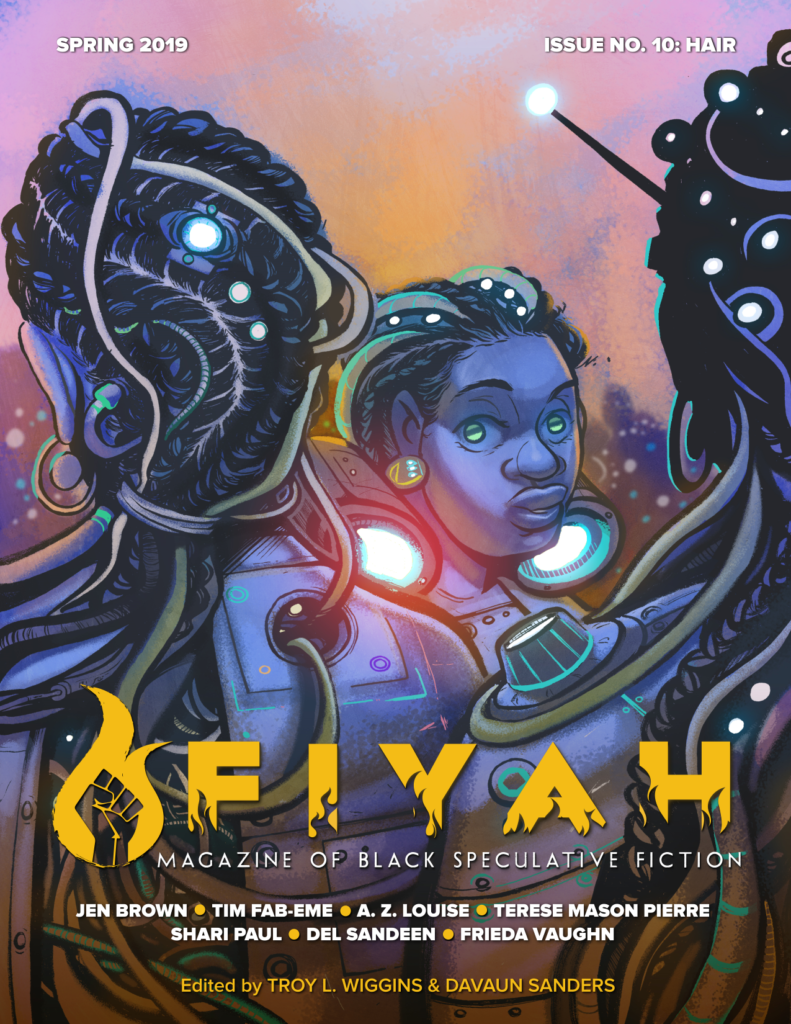
My favorite stories often revolve around similar themes: justice, community, gender, and religion. In April 2019, the dominant themes in my favorite stories were gender and justice (or lack thereof), two important topics that intersect our lives in countless ways. These stories include “In That Place She Grows a Garden” by Del Sandeen in FIYAH Literary Magazine; “A Conch-Shell’s Notes” by Shweta Adhyam in Lightspeed Magazine; and “Vīs Dēlendī” by Marie Brennan in Uncanny Magazine. I found these stories emotionally and intellectually engaging, and they asked me to approach the themes of gender and justice from a variety of perspectives.

